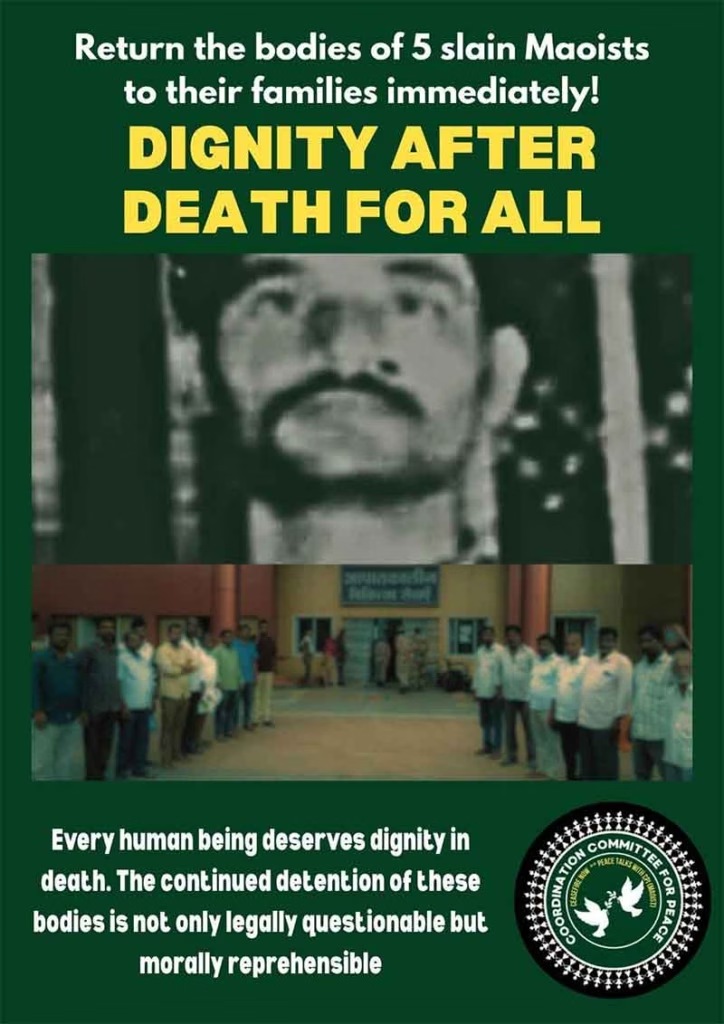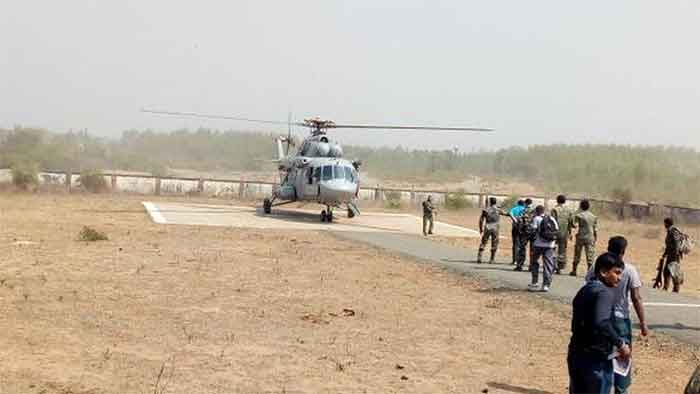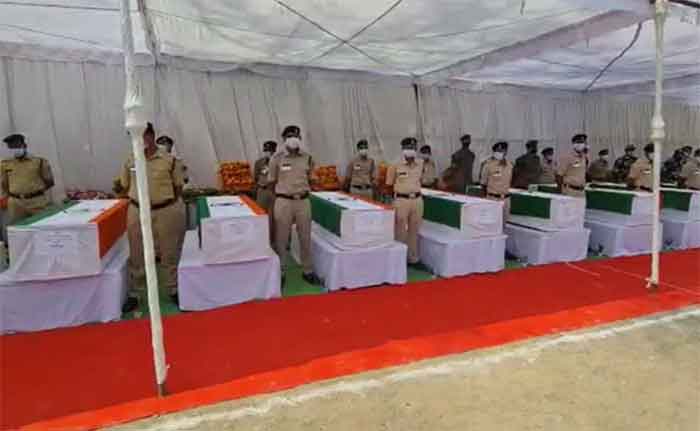
In yet another mockery of democracy, the RSS-led BJP central government, using the National Investigation Agency (NIA), has arrested Raghu Midiyami, an Adivasi rights activist from the mineral-rich region of Bastar, Chhattisgarh.
The 23-year-old, hailing from the Gond Adivasi community, was produced in the NIA special court today and sent to Jagdalpur jail after being taken into custody yesterday evening.
Raghu is accused by the NIA of being a top leader of a banned front organization, allegedly linked to the proscribed Communist Party of India (Maoist).
Raghu was the president of the recently banned Moolwasi Bachao Manch (MBM), an indigenous organization based in Bastar resisting the corporatization and militarization of their homeland by the Indian state.
According to a press release issued today by the NIA, Raghu was arrested in connection with a terror funding case in Chhattisgarh—RC-02/2023/NIA/RPR.
The reporter accessed the FIR registered in 2023, which includes charges under Sections 8(1), 8(3), and 8(5) of the Chhattisgarh Special Public Security Act, 2005, and Sections 10 and 13(1) & (2) of the Unlawful Activities (Prevention) Act, 1967.
The release stated that the case first came to light in November 2023 when the Chhattisgarh Police arrested and charge-sheeted two individuals identified as Over Ground Workers (OGWs) of MBM.
NIA claims that in February 2024, they uncovered further details of the alleged terror funding network.
NIA alleges that Raghu was responsible for collecting, storing, and distributing funds to support CPI (Maoist) activities.
Moolwasi Bachao Manch was led by Adivasi youth, including those who had lost family members during the genocidal Salwa Judum and Operation Green Hunt, initiated by the Congress government and funded by Ratan Tata in Bastar.
MBM grabbed national attention in 2021 for leading mass protests against the establishment of police camps in Silger, citing violations of the PESA Act, 1996, and the lack of Gram Sabha consent. The protests intensified after CRPF personnel killed four Adivasi villagers, including a pregnant woman, in a firing on May 17, 2021.
It was on October 30, 2024, that the Chhattisgarh government banned MBM under Section 3 of the Chhattisgarh Special Public Security Act (CSPSA), 2005, for one year.
The state government order on the ban does not mention anything about CPI (Maoist), but the NIA, in its statement, has linked the organization to the Maoist party.
Member of Parliament from Rashtriya Janata Dal, Manoj Jha, had mentioned in Parliament while condemning the ban on the organization.
Raghu is not the first member of Moolwasi Bachao Manch to be targeted.
Long before the ban, MBM’s vice president, 25-year-old Suneeta Pottam, was arrested by state police on June 3, 2024, under the Chhattisgarh Special Public Security Act, 2005, and remains behind bars.
Her arrest was condemned by the United Nations Special Rapporteur on the situation of human rights defenders, Mary Lawlor.
Sarju Tekam, another member of the organization, remains in jail after being arrested under UAPA and CSPSA on April 2, 2024. On November 8, 2024, six MBM members—Arjun Soni, Muya Hemla, Nagesh Banse, Joga Midiyam, Gillu Katam, and Bhima Kunjam—were also arrested and jailed.
Following the ban of MBM and arrest of fellow activists, Raghu who joined the organisation in 2021 had hinted at the possible arrest of his under UAPA.
Raghu had spoken to this reporter for Counter Currents and criticized the ban as a “gift” by the Indian government to corporations seeking to exploit Bastar’s land and resources.
Raghu had asserted that Moolwasi Bachao Manch was not against development and their struggle was to protect forests, water, land, and resources from being sold to corporations—leading to their targeting, defamation, and branding as Maoists.
At the time, Raghu had also expressed fears of assassination. He had believed he could be killed in a fake encounter as part of a state-led conspiracy. “If I’m alone, they’ll kill me. If I attend a protest, they’ll detain and kill me. If I’m in a city, they’ll still kill me,” he had warned.
Raghu stated that the Constitution held no value in Bastar and lawlessness prevailed. He further accused the government of growing more aggressive, causing villagers to live in fear because of growing numbers of police camps, continuous killings of Adivasis by security forces, aerial bombings, and arresting of innocent villagers on false charges.
While speaking to this reporter for Maktoob after the deaths of two Adivasi minors in May 2024 from an unexploded ordnance allegedly fired by security forces, Raghu had compared Bastar’s situation to war zones like Palestine.
According to MBM, Bastar was aerially attacked five times using Israeli made drones. The first occurred on April 19, 2021, in Botalanka and Palagudem. The second took place on the night of April 14-15, 2022, when drones bombed Bottethong, Mettagudem, Duled, Sakler, and Pottemangi. The third bombing happened on January 11, 2023, targeting Mettaguda, Bottethong, and Erapalli, with nine bombs dropped and firing from two helicopters.
Farce of Democracy
Condemning the arrest, the People’s Union for Civil Liberties (PUCL) Chhattisgarh, in its statement, said that people cannot be termed anti-government or anti-development simply for demanding that authorities follow the procedures stated in the Constitution.
The organization also criticized the use of the Chhattisgarh Special Public Security Act and UAPA against Adivasis who are democratically and peacefully raising their constitutional demands.
PUCL further demanded that the case against Raghu Midiyami be withdrawn, the ban on Moolvasi Bachao Manch be lifted, and other youth activists of the MBM, including Suneeta Pottam, Gajendra Madavi, and Shankar, be released immediately.
Condemning the arrest, Gandhian activist based in Chhattisgarh, Himanshu Kumar said, “ Raghu is a young social activist and fighter of Adivasi rights. Arresting him is an attack on democratic dissent.”
Himshanu dismissed the allegations of Moolvasi Bachao Manch as the frontal organization of Maoist party.
Additionally he stated, “Even if they (MBM) are Maoists, they are Maoists without weapons. Government continuously says they are ready for talks with Maoists if they are ready to give up arms, but see how they are even suppressing non armed groups”.
Kagaar- A war exists in Bastar
Advocate Ehtamam-Ul-Haque, a member of FACAM, who is not surprised by the arrest of Raghu, remarked that the arrest is part of a corporate-backed war on the people under Operation Kagaar.
Bastar, rich in natural resources, has been war-torn due to Operation Kagaar, where indigenous Adivasis have been resisting the Indian state for their survival.
All forms of resistance against the exploitation of jal, jangal, and jameen, continue in Bastar against corporate exploitation facilitated by the Indian government.
Ehtamam told the reporter, “Raghu and many others were at the helm of Moolwasi Bachao Manch, leading what was likely one of the biggest sustained mass movements of Adivasi peasants for their rights over Jal, Jungle, Jameen.”
Ehtamam added, “Raghu has been one of the prime targets of the Brahmanical Hindutva Fascist BJP-RSS government for quite some time, especially with the intensification of militarization and the massacres of Adivasis.”
“Raghu knew the cost involved—they all did. That is why the struggle of Adivasi peasants for their dignity and rights over Jal, Jungle, Jameen will endure, because they continue to fight despite knowing the price of their resistance.”
Ehtamam asserts that the ban on Moolwasi Bachao Manch and the arrests of Raghu, Suneeta Pottam, and another jailed Adivasi leader, Sarju Tekam, were meant to suppress solidarity movements across the country that posed a threat to the state’s unchecked war.
A resilient Ehtamam continued, “They have arrested a few, like Raghu and Sunita Pottam, but many more Sunitas and Raghus will emerge—such is the nature of the struggle for existence. This is how Raghu and Sunita were born—from the brutality of Salwa Judum”.
Ehtamam also views his arrest as a move by the government to prevent news of state violence from reaching the outside world.
He said, “The state wants to keep this war hidden. It wants a steady and unhindered flow of the people’s blood in the killing fields and a smooth flow of mineral ore through their slurry pipelines running across South Bastar.”
“That is why they are hell-bent on launching a war not just on the Naxalism of the gun but also on the so-called Naxalism of the pen—one of the many monikers of urban Naxalism,” he stated.
Ever since Operation Kagaar was initiated, the intensity of violence has escalated, as Raghu stated, and hundreds of Adivasis have lost their lives.
After the killing of 31 suspected Maoists on February 9 this year, Amit Shah declared, “Naxals will be eradicated by March 31, 2026.”
So far, more than 81 people have been killed this year by security forces after being accused of being Maoists.
According to FACAM, the eight people killed as Maoists on February 1 in the Tolimeta area, between the villages of Korcholi and Todka in Bijapur district, were not Maoists but Adivasi villagers.
Human rights defenders have challenged the authenticity of these encounters, asserting that most of those killed were unarmed villagers, not Maoists.
According to government reports, 219 alleged Maoists were killed in 2024. However, PUCL Chhattisgarh has documented several cases where unarmed Adivasi villagers were killed in staged encounters by government forces and falsely labeled as Maoists.
PUCL reports that on January 19, two teenage girls, Nagi Punem and Soni Madkam, along with an adult, Kosa Karam, were killed. On January 27, a peasant named Podiya Mandavi was killed in police custody. On February 25, three villagers—Anil Hidko, Rameshwar Negi, and Suresh Teta—were killed. On March 27, four villagers were killed. On April 2, two villagers, including a deaf and mute girl, Kamli Kunjam, were killed. On May 11, twelve villagers were killed. On November 8, two villagers, Hidma Podiam and Joga Kunjam, were killed. On December 11, six villagers were killed in two separate incidents, and on December 12, two more villagers were killed.
Activists argue that the actual death toll is even higher than 219, as certain killings are excluded from the government’s count. These include the murder of a six-month-old toddler, Mangli Sodi, on January 1, and children killed by mortar shells in May. The government has instead blamed Maoists for these killings, despite evidence suggesting they were committed by its own forces.
Additionally, human rights defenders face significant challenges in documenting the identities of those killed, making it difficult to verify whether they were unarmed villagers or armed Maoists.
Rejaz M Sheeba Sydeek is an independent journalist based in Kerala, reporting on the stories of oppressed masses and state violence.














































